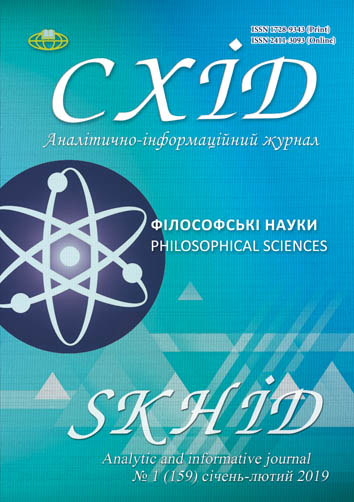Chinese legal-philosophic syncretism and its influence to value orientations of the Chinese society
DOI:
https://doi.org/10.21847/1728-9343.2019.1(159).157856Keywords:
China, social relations, value orientations, legal-philosophic syncretism, legal policy, mental traditionsAbstract
The article is devoted to researching of historical-cultural and legal-philosophic factors that influence on the formation of value orientations inside the Chinese society. The analysis of these factors was made by using of the historical-philosophical method, which enables to trace the turning points of cultural genesis of Chinese civilization, as well as the specifically-historical approach. The last one contributes to a better understanding of the current status of Chinese socio-cultural reality, in its dependence on the recent past events, and on the Chinese traditional spiritual values. In conclusion it’s stated that the essence of actual Chinese approach to regulation of wide-range social relations could be defined as a "legal-philosophic syncretism".References
Bodde, D. & Morris, C. (1973). Law in Imperial China: Exemplified by 190 Ching Dynasty Cases with Historical, Social, and Judicial Commentaries. University of Pennsylvania Press, Philadelphia: 14-15 (In English).
Deng, Xiaoping. (2010). Building a Socialism with a Specifically Chinese Character. Selected Works, Vol. 3 (1982-1992); Beijing: 306 p. (In English).
Farah, P. D. (2008). The Influence of Confucianism on the Construction of the Chinese Political and Juridical System. Identità europea e politiche migratorie. Vita e Pensiero (V&P), Milano: 193-226 (In Italian; In English).
Fifteenth National Congress of the Communist Party of China. 12-18 September 1997. Rénmín rìbào 人民日報. 13.09.1997. Archive: 1-3 (In Chinese).
Guang, Shen. (2018). Revision of China’s Legislation Law: Towards a More Orderly, Fair and Just Legal System. Hong Kong Law Journal (香港法律杂志). 48 (3): 1137-1158. (In English)
Lam, W. (2016). Xi Jinping’s Ideology and Statecraft. Chinese Law & Government. 48 (6): 409-417. DOI: 10.1080/00094609.2016.1241098. (In English)
Loubna, El Amine. (2017). Classical Confucian political thought: a new interpretation. Princeton University Press, Princeton: 232 p. (In English)
Maddison, A. (2007). Chinese Economic Performance in the Long Run: 960-2030 AD. OECD, Paris. Retrieved from: http://piketty.pse.ens.fr/files/Maddison07.pdf (In English)
Maidanyk, R. A. (2012). Civil Law: General Part. Alerta, Kyiv: 472 p. (In Ukrainian).
Perelomov, L. S. (1993). Book of the Ruler of Shang Region (商鞅书); [translation from Chinese]. Ladomir, Moscow: 390 p. (In Russian).
REUTERS. October 8, 2017. Chinese watchdog says 1.34 million officials punished for graft since 2013. Retrieved from: https://www.reuters.com/article/us-china-corruption/chinese-watchdog-says-1-34-million-officials-punished-for-graft-since-2013-idUSKBN1CD04B (In English).
Senger, H. (2004). Stratagems. On Chinese art of living and surviving. The famous 36 stratagems over three millennia. Book 1. EKSMO, Moscow: 510 p. (In Russian).
Sevalnev, V. V. (2014). Counteracting the corruption: an experience of the PRC. Journal of Foreign Legislation and Comparative Law. 1: 89-96 (In Russian).
Tao Yang, D. (2008). China’s Agricultural Crisis and Famine of 1959-1961: A Survey and Comparison to Soviet Famines. Comparative Economic Studies. 50: 1-29 (In English).
Troshchinskiy, P. V. (2015). Combating crime in China: legal-regulatory aspect. The Law Journal. 8: 47-58. DOI: 10.12737/12227 (In Russian).
United Nations Framework Convention against Organized Crime. Adopted on July 21, 1997. Retrieved from http://zakon.rada.gov.ua/laws/show/995_786 (In Ukrainian).
Wai-Ying, Wong (2019). Confucian ethics in Western discourse. Bloomsbury Academic, Sydney: 279 p. (In English).
Ya Qin, J. (2011). Pushing the Limits of Global Governance: Trading Rights, Censorship and WTO Jurisprudence: A Commentary on the China-Publications Case. Chinese Journal of International Law. 10 (2): 271-322. DOI: https://doi.org/10.1093/chinesejil/jmr017 (In English).
Yan, Fu (2014). FǎYì (法義). The Spirit of the Laws [Montesquieu, C.; translated from the original French into Chinese & English, by Yan Fu]. Beijing Times Chinese Paper Bureau, Beijing: 683 p. (In Chinese; In English).
Yi-Huah, Jiang (2018). Confucian Political Theory in Contemporary China. Annual Review of Political Science. 21: 155-173 (In English).
Zhang, Qing (1989). The Chinese theory of criminal punishment for economic crimes. Chinese Legal Database, available at: http://www.lawinfochina.com/ (Beijing; Chinese; In English).
Zhenfan, Zhang (1989). Economic crimes and counteracting measures. Chinese Legal Database, available at: http://www.lawinfochina.com/ (Hebei; In Chinese; In English).
Downloads
Published
How to Cite
Issue
Section
License
Copyright (c) 2019 Oleksandr Stovpets

This work is licensed under a Creative Commons Attribution-NonCommercial-NoDerivatives 4.0 International License.
1. Authors bear responsibility for the accuracy of facts, quotations, numbers and names used.
2. Manuscripts are not sent back.
3. The publisher does not always agree with the authors' opinion.
4. The authors reserve the right to authorship of the work and pass the first publication right of this work to the journal under the terms of a Creative Commons Attribution Non-Commercial License, which allows others to freely distribute the published research with the obligatory reference to the authors of the original work and the first publication of the work in this journal.
5. The authors have the right to conclude separate supplement agreements that relate to non-exclusive work distribution in the form in which it has been published by the journal (for example, to upload the work to the online storage of the journal or publish it as part of a monograph), provided that the reference to the first publication of the work in this journal is included.

